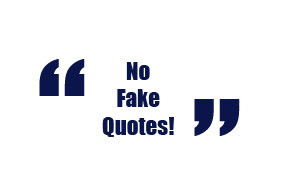
Never Fake a Quote!
5 Reasons to ALWAYS get real words from real people
Everyone’s seen it.
A guy with a bad hairpiece … a lady with a facelift that’s got the skin just a little too tight for a 65 year-old.
They’re fake, everyone knows they’re fake, and they create a halo-effect that clouds people’s overall impression of the person sporting them.
It’s not all that different when writers make up a quote instead of getting the real thing. But in this case, they not only damage the credibility of the person they “quote,” they also hurt themselves, their readers and their craft.

The way people talk – the words they choose, how they string them together, their rhythm and pacing – is a critical part of who they are. It’s like their fingerprints, their facial features, their DNA.
And we only get that true identity, that unique personality, by hearing it right from the source.
If we fake it, and make up something we THINK they would have said, everyone loses.
Quotes, real words from real people, pump life into our writing. Done right, they bring that person — and our stories — to life.
When we fake it, things come out flat.
There are lots of reasons we’re sometimes tempted to manufacture a quote, frighteningly tight deadlines and overly protective “handlers” blocking access to their bosses, among them.
Five reasons to fight the urge to fake it.
No matter our skills as copywriters, we’ll never match the richness of a real person talking about something they care about. Even when a subject may be narrow or mundane, people draw from their whole life experience when they talk. Quotes often give us insights into a person’s age, their points of reference, how and where they were brought up and the experiences they’ve had. They add flavor and pleasant surprises to our writing. They keep our readers engaged.
David Cromie, a Silicon Valley filmmaker I once took a class from, had a valuable saying: “Never talk with the head of PR when the president will do.” People want to hear from the real decision maker, from the “spark plug” who’s driving a new initiative and who has skin in the game, not from corporate spokespeople. It’s our job to give them that one-on-one contact.
Project drivers want the opportunity to effectively state their case, with feeling. But all too often — especially in corporate settings — we’re given only the bland, committee-approved corporate statements presented as “CEO quotes” in press releases or organizational announcements. A direct conversation with the leader will almost always produce comments that are richer, more compelling and more genuine.When we use only the manufactured quotes, we miss an opportunity to strengthen the message and convey the leader’s personal perspective and commitment to the issue, something you only get through direct interaction.
There’s a trick to interacting with people in an interview situation, and it takes some practice to become both comfortable and competent. Doing a lot of live, face to face interviews and interacting directly with senior decision makers is the only way we start climbing up that learning curve. It’s a valuable part of our development as writers — and as people.
For corporate communicators, it’s helpful to be exposed to the top decision makers and be recognized by the boss as a knowledgeable person who asks insightful, relevant questions about an important project. Asking the right questions –at the right time — will sometimes help a leader refine the approach to an important issue. Repeat this process enough times, and there’s often an invitation to take part in the discussion earlier in the process.
I don’t think I’ve ever come away from an interview without being surprised and learning something more than I went in looking for. People have rich, multidimensional lives and jobs, and only through interacting with them do we get a glimpse into the complexities they face, the pressures, the countervailing forces they deal with and the way they think about the subject and their own role in it.
And the quotes that come out of such an interview reflect that richness and create compelling stories. They enrich our lives, and those of our readers.



Leave A Comment